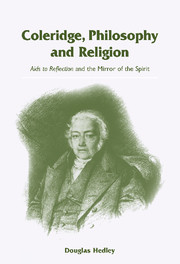Book contents
- Frontmatter
- Contents
- Acknowledgements
- List of abbreviations
- Notes on the text
- Prologue: explaining Coleridge's explanation
- 1 The true philosopher is the lover of God
- 2 Inner word: reflection as meditation
- 3 The image of God: reflection as imitating the divine spirit
- 4 God is truth: the faculty of reflection or human Understanding in relation to the divine Reason
- 5 The great instauration: reflection as the renewal of the soul
- 6 The vision of God: reflection culture, and the seed of a deiform nature
- Epilogue: the candle of the Lord and Coleridge's legacy
- Bibliography
- Index
4 - God is truth: the faculty of reflection or human Understanding in relation to the divine Reason
Published online by Cambridge University Press: 15 December 2009
- Frontmatter
- Contents
- Acknowledgements
- List of abbreviations
- Notes on the text
- Prologue: explaining Coleridge's explanation
- 1 The true philosopher is the lover of God
- 2 Inner word: reflection as meditation
- 3 The image of God: reflection as imitating the divine spirit
- 4 God is truth: the faculty of reflection or human Understanding in relation to the divine Reason
- 5 The great instauration: reflection as the renewal of the soul
- 6 The vision of God: reflection culture, and the seed of a deiform nature
- Epilogue: the candle of the Lord and Coleridge's legacy
- Bibliography
- Index
Summary
Ever since the creation of the world his invisible nature, namely, his eternal power and deity, has been clearly perceived in the things that have been made.
(Romans 1: 20)… it is no mere verbal bond which unites truth of revelation to truth of discovery.
(F. J. A.Hort)It is still a metaphysical faith that underlies our faith in science – and we men of knowledge today, we godless men and anti-metaphysicians, we, too still derive our flame from the fire ignited by a faith millennia old, the Christian faith, which was also Plato's, that God is truth, that truth is divine.
(Nietzsche)Hume, in his Dialogues Concerning Natural Religion, uses the figure of Simonides from Cicero's classic work on natural theology De Natura Deorum as a figure of caution and prudent reserve in the attempt to show that the postulation or assumption of a spiritual world as the basis of the material world is unwarranted. Simonides' unwillingness to answer the question of the nature of God is taken by Hume as an instance of genuine philosophical caution. Coleridge employs the figure of Simonides for his own purposes:
I would disturb no man's faith in the great articles of the (falsely so called) Religion of Nature. But before the man rejects, and calls on other men to reject, the revelations of the Gospel and the Religion of all Christendom, I would have him place himself in the state and under all the privations of a Simonides, when in the fortieth day of meditation the sage and philosophic Poet abandoned the Problem in despair.
(Aids, p. 239, cf. pp. 557 ff.)- Type
- Chapter
- Information
- Coleridge, Philosophy and ReligionAids to Reflection and the Mirror of the Spirit, pp. 193 - 228Publisher: Cambridge University PressPrint publication year: 2000



